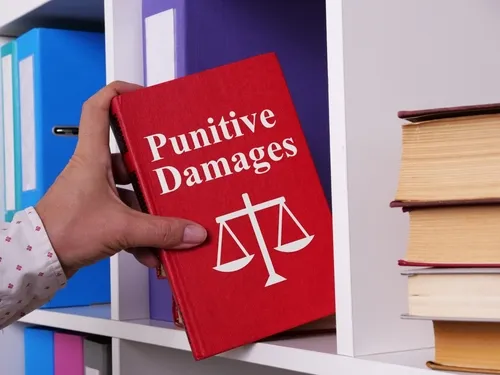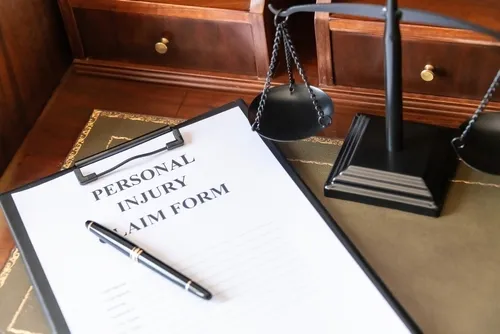As a dedicated Atlanta personal injury law firm, Ross Moore Law is committed to helping victims of negligence receive the justice they deserve. You can seek punitive damages in Georgia if the defendant was grossly negligent. These damages are intended to punish reckless behavior.
What cases qualify for punitive damages in Georgia? Is there a limit on punitive damages? How do you claim these damages in a lawsuit? This article answers these questions and more.
What Are Punitive Damages in a Lawsuit?
Punitive damages, also known as exemplary damages, are money awarded in civil lawsuits that go beyond compensating the plaintiff for losses. Their purpose is to punish the defendant for particularly harmful behavior and to deter both the defendant and others from similar conduct in the future. Unlike compensatory damages, which reimburse victims for actual losses like medical expenses and lost wages, punitive damages focus on the nature of the defendant’s actions.
In Georgia, punitive damages are awarded when clear and convincing evidence demonstrates that the defendant’s actions exhibited willful misconduct, malice, fraud, wantonness, oppression, or a complete lack of care indicating conscious indifference to consequences. This means that the defendant’s behavior must be more than just negligent; it must reflect a deliberate disregard for the rights and safety of others.
What Cases Qualify for Punitive Damages in Georgia?
Not all personal injury cases are eligible for punitive damages. These damages are reserved for situations where the defendant’s conduct is especially egregious. The following are examples of cases that may qualify for punitive damages in Georgia.
- Drunk or Drugged Driving Accidents: Driving under the influence of alcohol or drugs demonstrates a reckless disregard for others’ safety, and courts may award punitive damages to DUI accident victims.
- Product Liability Cases: If a manufacturer releases a defective product that poses significant risks and fails to warn the public, injured consumers can seek punitive damages.
- Assault and Battery: Victims of intentional violence, such as assault, can claim punitive damages in a personal injury lawsuit.
- Nursing Home Abuse: The mistreatment or neglect of elderly residents in care facilities can lead to punitive damages.
- Fraudulent or Malicious Acts: Actions involving intentional deceit or malice that cause significant harm may also justify punitive damages.
Punitive damages are not awarded in cases of ordinary negligence. The defendant’s actions must rise to a level of gross negligence or intentional misconduct.
Is There a Cap on Punitive Damages in Georgia?
Georgia law imposes a general cap of $250,000 on punitive damages in most cases. However, there are critical exceptions where this cap does not apply.
Product Liability Cases
In lawsuits involving defective products, there is no upper limit on punitive damages. However, 75% of any punitive damages awarded in these cases, after deducting litigation costs and attorney’s fees, must be paid to the state treasury.
Specific Intent to Harm
If it is proven that the defendant acted with the specific intent to cause harm, the punitive damages cap is lifted, allowing the jury to award any amount deemed appropriate.
Defendant Under the Influence
Cases where the defendant was under the influence of alcohol or drugs (excluding lawfully prescribed medications taken as directed) at the time of the incident are exempt from the punitive damages cap. This exemption aims to deter individuals from engaging in dangerous behaviors while impaired.
Understanding these exceptions is crucial for plaintiffs seeking punitive damages, as they significantly impact the potential compensation in a lawsuit.
Claiming Punitive Damages in a Personal Injury Lawsuit
Pursuing punitive damages in Georgia involves a specific legal process with strict requirements.
Explicitly Request Punitive Damages
The plaintiff must explicitly claim punitive damages in the initial complaint. Failing to do so may forfeit the right to seek such damages later in the proceedings.
Burden of Proof
The plaintiff must provide clear and convincing evidence that the defendant’s actions were willfully malicious, fraudulent, wantonly negligent, or oppressive. This is a higher standard of proof than the “preponderance of the evidence” standard typically used in civil cases.
Two-Part Bifurcated Trial
Georgia law mandates a two-phase trial process when punitive damages are sought. In the first phase, the jury determines liability and compensatory damages. They also decide whether the evidence warrants punitive damages.
If punitive damages are deemed appropriate, a separate proceeding is held to decide the amount of punitive damages. The jury may consider the following factors:
- The severity of the defendant’s actions
- Previous reckless or criminal behavior by the at-fault party
- The chances that the defendant will repeat the behavior
- The defendant’s financial situation and ability to pay
Other Damages in Personal Injury Cases
When someone is injured due to another person’s negligence or reckless behavior, Georgia law allows them to recover different types of damages.
Compensatory damages are meant to help the injured person get back on their feet and recover from the harm they’ve suffered. There are two main categories of compensatory damages: economic damages and noneconomic damages.
Economic Damages
Economic damages are the financial losses that result directly from the injury. These are usually easy to calculate because they come with clear dollar amounts, like bills or receipts.
- Medical Bills: This includes the cost of emergency care, doctor visits, surgery, and other treatment. If the injury requires ongoing care, future medical expenses can also be included.
- Lost Wages: If you miss work because of your injury, you can recover the income you lost.
- Loss of Earning Capacity: If your injury prevents you from returning to your job or working in the same capacity, you may also be entitled to compensation for reduced earning potential.
- Property Damage: You can seek compensation for the cost of repairing or replacing damaged property, such as your vehicle or personal belongings.
Non-Economic Damages
Non-economic damages are more subjective and don’t come with a price tag. However, they can be just as impactful as financial losses, sometimes even more so. These damages reflect the emotional and psychological toll of an injury.
- Pain and Suffering: This covers the physical pain and emotional distress caused by the injury. Chronic pain, discomfort, trauma, and emotional anguish all fall under this category.
- Reduced Quality of Life: If your injury prevents you from enjoying daily activities, hobbies, or relationships the way you used to, you may be compensated for the loss of enjoyment in life.
- Emotional Distress: Injuries can lead to anxiety, depression, insomnia, or even post-traumatic stress disorder (PTSD). These mental health impacts are considered part of your non-economic damages.
- Loss of Consortium: In severe cases, an injury might affect your relationship with your spouse or family. Compensation for loss of companionship, affection, or support can also be included.
While non-economic damages are harder to calculate, they are crucial for helping injury victims receive full and fair compensation for their suffering.
Contact an Atlanta Personal Injury Lawyer Today
At Ross Moore Law, we are dedicated to helping clients in Atlanta and across Georgia get the compensation they deserve. Our firm has won millions for accident victims. We carefully investigate each case, gather the right evidence, and fight aggressively for your rights.
Whether you were hurt in a car accident or on someone’s property, our team can help you navigate the legal process. Call 404-445-8122 or contact us online for a free consultation.




